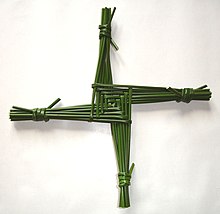Imbolc is the time of year when I like to start new projects and endeavours. Imbolc would be an excellent time to celebrate a transition from one gender to another. It’s the time when the first signs of spring appear (at least in my neck of the woods – your local climate may vary). The goddess most closely associated with Imbolc is Brighid, goddess of smithcraft, poetry, and healing.
Some people wait until the first snowdrops appear before they celebrate Imbolc. Snowdrops are the first flowers to appear after the long cold winter. Hence they, and the festival, represent the first stirrings of new life after the darkness, cold, and sleep of the winter.
In 2007 and 2008, I participated in the annual Imbolc poetry slam in honour of the goddess Brighid, with these Imbolc haikus. The poetry slam started in 2005, has been happening every year since then, and happened on Facebook in 2016 and 2017.The derivation of the word Imbolc is not clear. The most common etymology is that is comes from the Old Irish i mbolc, (“in the belly”), and refers to pregnant ewes. It may be derived from Old Irish imb-fholc, “to wash or cleanse oneself”. This would be consistent with the Latin meaning of February, the month of cleansing.
At this time, sheep are giving birth to lambs, and the trees start putting forth new growth, whose twigs are often red.
In England, Brigantia (who may be the same goddess as Brighid) is the goddess of sovereignty and the land, so this could be a good time to celebrate regaining one’s personal sovereignty or autonomy.
Further reading
- Paganism for Beginners: Festivals
- An inclusive wheel of the year
- Imbolc/Candlemas (Goddess and the Green Man)
- Imbolc customs and lore (Circle Sanctuary)
- Brigit, by Susa Morgan Black (OBOD)
- Brigid: Survival of a Goddess, by Winter Cymres (OBOD)
- Fire in the Forge (Brighid, Goddess and Saint)
- Brigid in the Carmina Gadelica:
Genealogy of Bride (notes). Sloinntireachd Bhride
Genealogy of Bride. Sloinntireachd Bhride
Bride The Aid-Woman. Bride Ban-Chobhair
If you enjoyed this post, you might like my books.
![Snowdrops in the snow. Photo by Sunflair. [Public Domain, CC0]](https://dowsingfordivinity.files.wordpress.com/2018/01/snowdrops-1166564_960_720.jpg?w=300)



